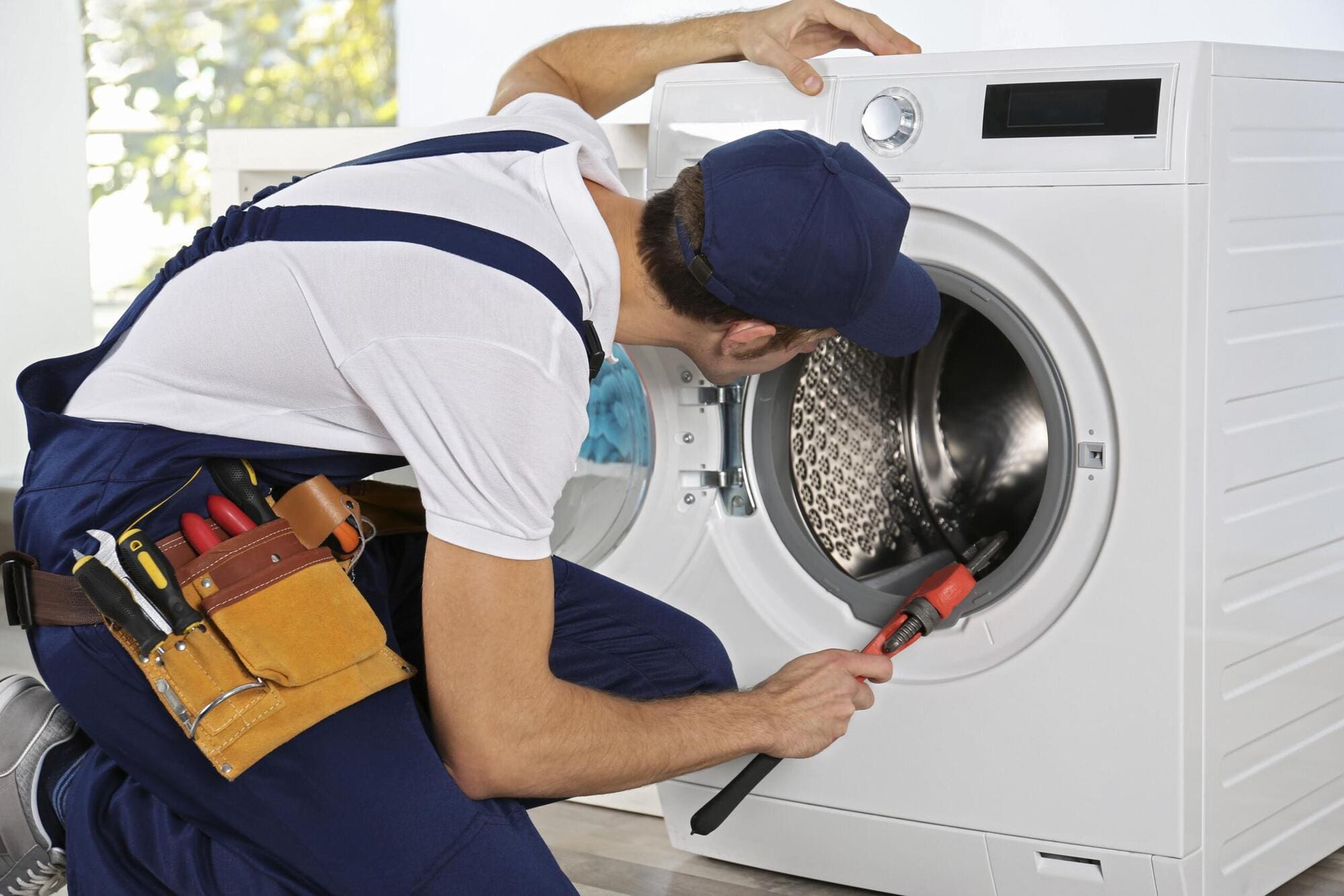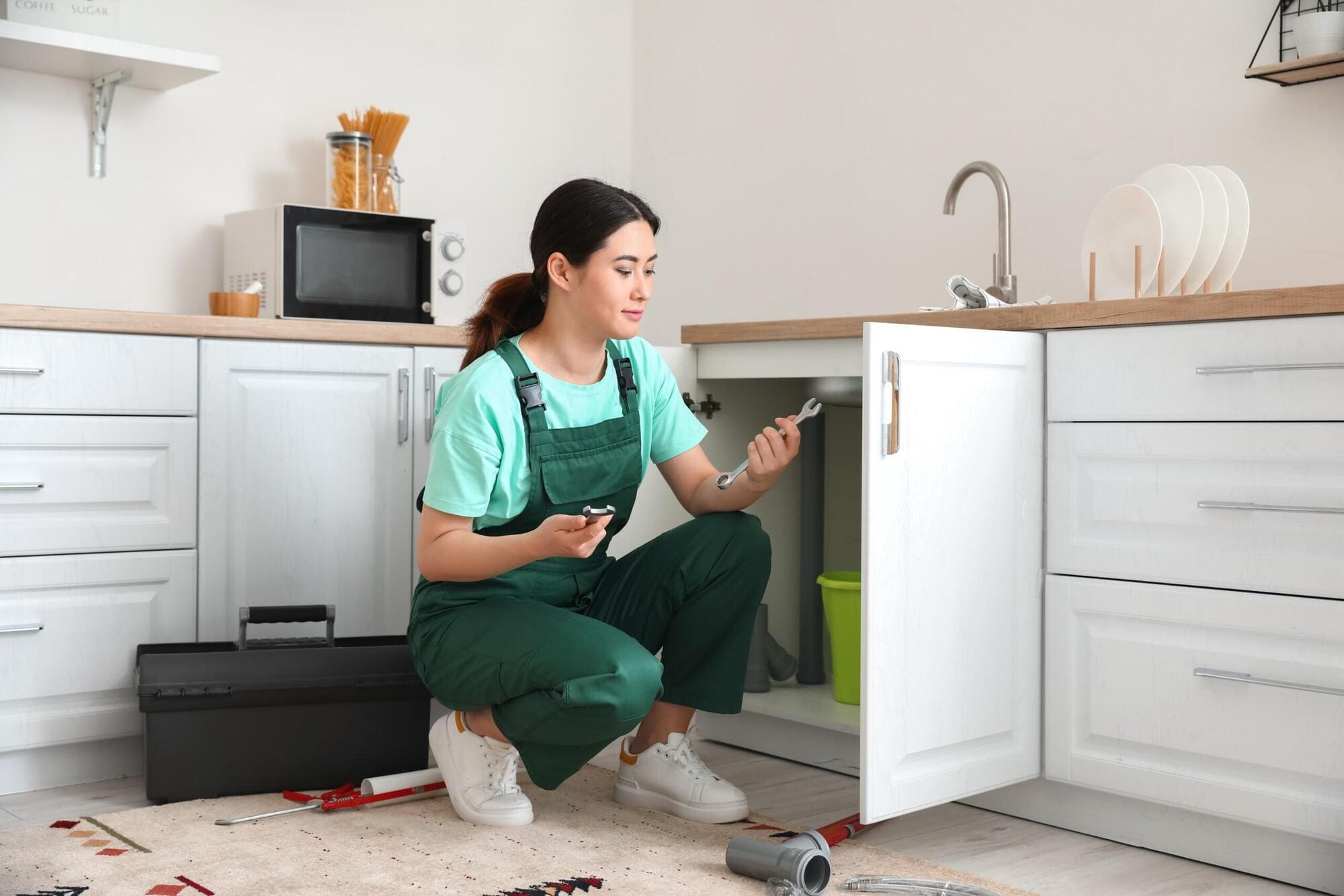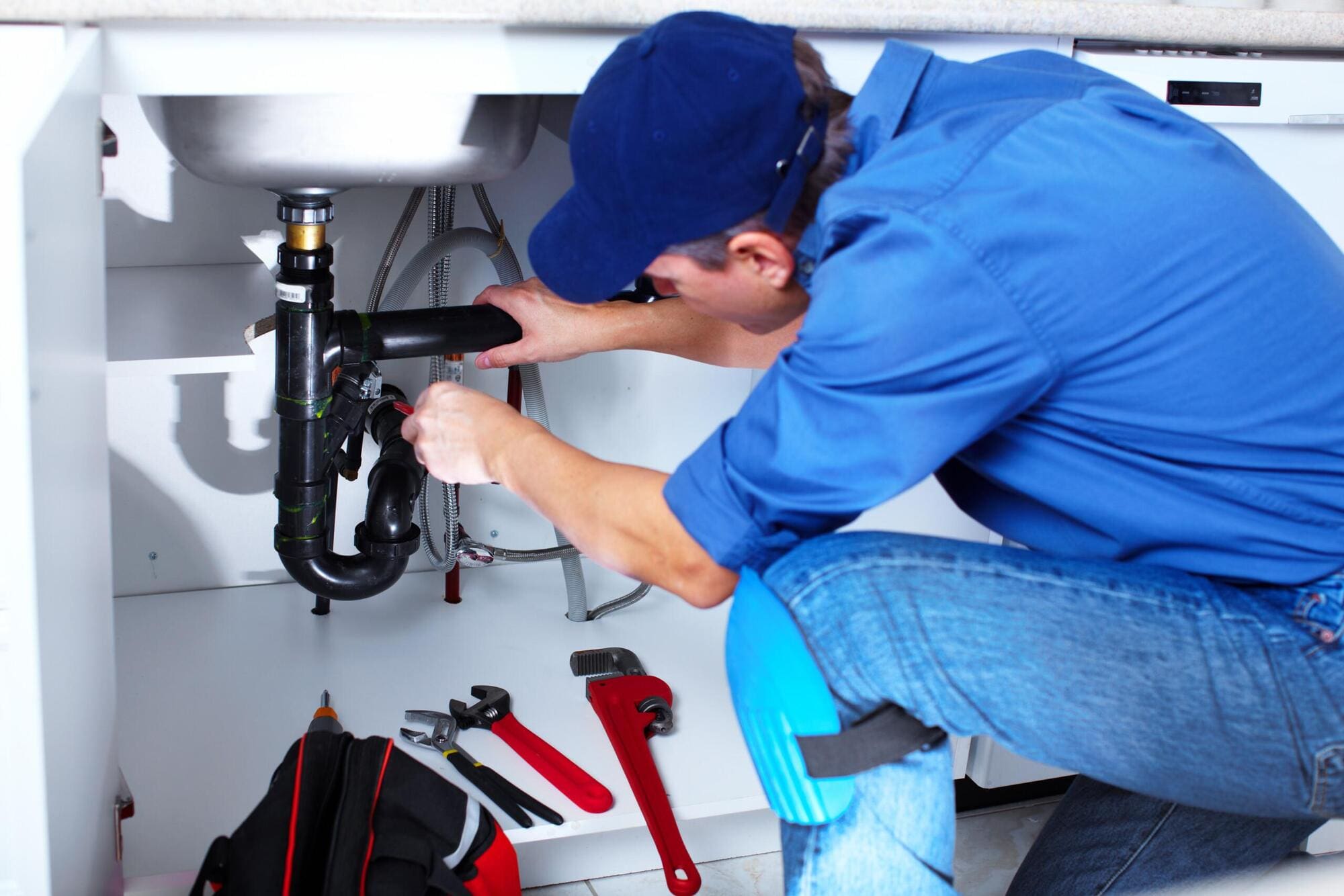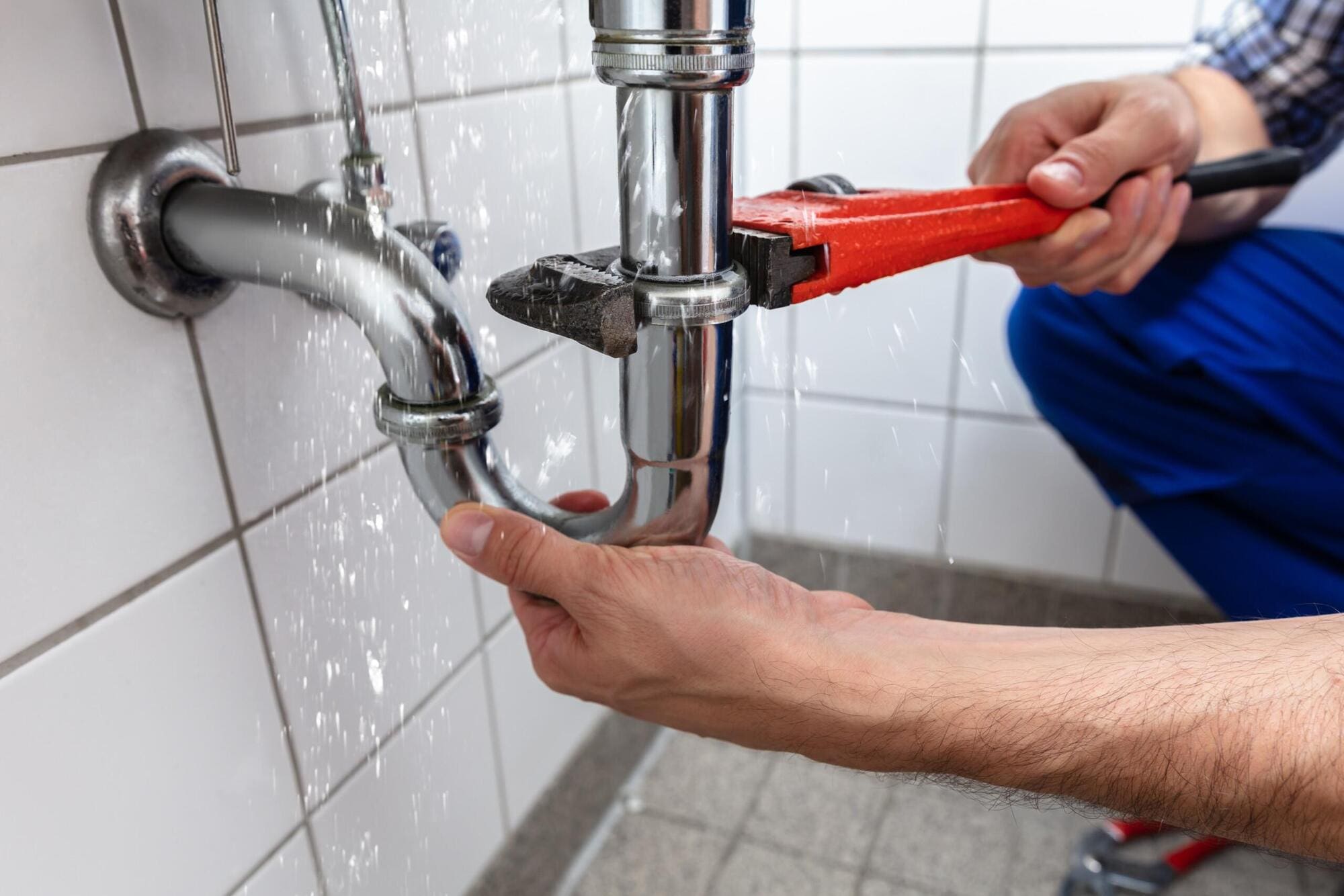In this Plumbers Career Guide
What Does A Plumber Do?
A plumber’s name dates back to the Roman Empire! It comes from ‘plumbum’, the Latin word for lead (Pb). Plumbers are skilled tradespeople who install, maintain and repair various plumbing systems, e.g. heating, hot and cold water, sewage and drainage, and associated piping, fittings and apparatus. They can work in residential, commercial or industrial premises and specialise in working on specific systems, e.g. gas or water. Therefore, what a plumber does will depend on who they work for, their role and their specialisms.
A plumber’s main aim is to ensure systems and piping are correctly fitted, maintained and repaired and comply with the relevant legal standards and codes. They also have an important role in helping people in an emergency, e.g. burst water pipes and boiler breakdowns.
Plumbers will carry out many tasks, including travelling to jobs, speaking to customers, estimating jobs and providing quotes, finding and repairing faults, installing various plumbing systems, piping and fittings, responding to emergencies, etc. The role may also involve paperwork completion and computer work.
Plumbers can work and liaise with many people, such as designers, maintenance staff, customers/clients (business or private), suppliers, retailers, contractors, subcontractors, and other tradespeople (heating engineers, gas engineers, electricians, etc.). They may also have to deal with the Gas Safe Register (gas registration body), building inspectors, Construction Skills Certification Scheme (CSCS) providers, the Health and Safety Executive (HSE), local authorities, and others.
A plumber can work for small businesses, e.g. subcontractors and small plumbing companies, and organisations with a few hundred employees, such as large housebuilding firms. They can be self-employed and have their own business where they may work on their own or employ others. They can also work freelance or for a recruitment agency on a temporary or contract basis.

Responsibilities
A plumber’s responsibilities will depend on the industry they work in, who they work for, and the activities carried out by the business.
Some examples of common duties for plumbers can include (this list is not exhaustive):
- Complying with relevant regulations, safety standards and codes.
- Following technical drawings (i.e. for new installations).
- Travelling to homes, businesses or sites, e.g. construction and new builds.
- Speaking to customers about the problem or what work they want them to do.
- Estimating the cost and time it will take to do the job, including taking measurements and completing plans.
- Installing various plumbing systems, e.g. heating, water and drainage, and pipes and fittings.
- Assessing issues, identifying faults and carrying out the required repairs.
- Using various equipment to diagnose problems.
- Fitting and fixing domestic plumbing-related appliances, e.g. washing machines and showers.
- Measuring, cutting, bending and joining pipes and fittings.
- Maintaining and servicing heating systems (e.g. oil and gas) and radiators.
- Responding to emergency callouts, e.g. burst water pipes, blocked drains and boiler breakdowns.
- Unblocking toilets, drains, sinks and other systems and piping.
Working Hours
A plumber can expect to work 37–40 hours a week. However, they can do more or fewer hours depending on their role. A self-employed plumber will tend to do more hours. There are permanent, temporary, contract, full-time and part-time opportunities available.
Being a plumber is not a 9–5 job, and they often have to work unsociable hours, e.g. early mornings, evenings, nights, weekends and bank holidays. These hours are more likely when they offer emergency services, e.g. boiler breakdowns and burst water pipes or leaks.
Plumbers typically need to travel locally or nationally as part of their role. There may also be some overseas work opportunities.

What to Expect
There are many positives to being a plumber, especially if an individual is practical and enjoys working with their hands. Installing new plumbing systems and seeing the finished result can be fulfilling and give individuals a sense of pride. Also, identifying problems, making repairs and knowing that customers are happy can be rewarding.
Plumbing emergencies, such as burst water pipes and broken boilers, can be stressful. Plumbers help homeowners and businesses in need and can even be lifesavers in some situations, e.g. fixing heating systems and ensuring the elderly and infirm have warm homes. Plumbers can go home at the end of their working day knowing their job makes a positive difference to people’s lives.
Individuals do not need a degree to become a plumber, so it can suit those who are less academic than others. However, they will still need to learn about the different plumbing systems and must be comfortable with the practical aspects of the job.
Plumbing is a skilled trade, and experienced plumbers are in demand. Therefore, there is no shortage of permanent and temporary roles. Jobs are available nationally and internationally, and there are opportunities to be employed, self-employed or freelance. As skilled tradespeople, plumbers can earn decent salaries, especially once experienced.
Being a self-employed plumber and having an opportunity to be your own boss can be attractive. It can give individuals the independence to take charge of their working day and overall career progression. It can also help them achieve a decent work-life balance.
Plumbers are unlikely to get bored. They will carry out various jobs, from new installations to repairs and emergencies. Their role involves planning, investigating and fixing, which will require different materials, equipment and techniques. Some plumbers will travel in their local area and nationally, so they will get to see various places and meet many people.
Even though there are positives to being a plumber, there are challenges and cons, e.g.:
- Health and safety risks – plumbers will face many hazards during the course of their work, e.g. welding/solder fume, asbestos, manual handling of materials, use of tools, equipment and machinery, gas, legionella, scalding, confined spaces, noise, vibration, other hazardous substances, sewage (biological hazards), slips, trips and falls, work at height, etc.
- Physical demands – being a plumber is physically demanding. They will be on their feet for most of the working day, and the role will involve manual handling. There may also be work at height and in cramped and confined spaces. Individuals will need a good level of physical fitness. There may also be intricate work that requires immense concentration, which can cause fatigue. Plumbers may need to work outside in all weather for some jobs. They may also need protective equipment, which can be hot and uncomfortable.
- Mental demands – being a plumber is also mentally demanding. They will often need to complete jobs to deadlines and may face various emergencies where they must think and act fast to get the situation under control. This can be stressful, especially if things do not go according to plan. There is a lot of pressure, and mistakes can be costly. Customers can also be challenging to deal with at times.
- Unpleasant sights and smells – individuals should not be squeamish if they want to become plumbers, as they can deal with unpleasant situations. They may be required to unblock toilets, sinks and drains, exposing them to rotten food, human waste and other health hazards.
- Male-dominated profession – the number of women in skilled trades, such as plumbing, is low (approximately 2%). However, it should not put off women who want to enter the profession, as numbers are starting to increase.
Every career choice has pros and cons, and individuals must know what to expect before deciding whether it is a suitable career. The role is physically and mentally demanding, and there are health and safety risks. The profession is also male-dominated, and plumbers can be exposed to unpleasant sights and smells. However, there are many positives too. Individuals who become plumbers enjoy working with their hands and not being stuck behind a desk at a 9–5 job.
When considering whether to be a plumber, individuals should look at the pros and cons. They should also ensure they have the right personal qualities to carry out the role and responsibilities required.
Personal Qualities Needed To Be A Plumber
Some of the personal qualities a plumber requires will include (this list is not exhaustive):
- The ability to use IT and software packages.
- Manual dexterity and good coordination.
- Reliable, honest, trustworthy and punctual.
- Enjoys working with their hands.
- Patient, persistent, practical and confident.
- Friendly and approachable.
- Physically fit and with stamina and strength.
- Knowledge of the different types of plumbing systems, piping and fittings.
- Knowledge of relevant regulations, standards and codes.
- Knowledge of building and construction.
- Knowledge of maths and numeracy.
- Knowledge of health and safety.
- Excellent communication skills, both written and verbal.
- Customer service skills.
- Interpersonal skills.
- Problem-solving skills.
- Technical and mechanical skills.
- Organisational and time management skills.
- Being thorough, accurate and having excellent attention to detail.
- The ability to interpret and follow technical drawings and specifications.
- The ability to use and maintain various hand tools, equipment and machinery.
- The ability to work well with others and alone using own initiative.
- The ability to work quickly and efficiently, prioritise different demands and meet tight deadlines.
- The ability to work under pressure and remain calm in stressful situations.
- The ability to be flexible and adapt to change.
- The ability to accept criticism.
Qualifications
There are many different routes to becoming a plumber, and individuals do not require formal qualifications (unless they work with gas). Individuals could go to college, enrol on a course with a private training provider, apply for an apprenticeship or apply directly to companies. They could also do work experience to help them enter the role.
College/private training
Undertaking a college or private training course can help individuals become a plumber.
Some examples are as follows (this list is not exhaustive):
- Level 1 Diploma in Plumbing Studies.
- Level 2 and Level 3 Diploma in Plumbing and Domestic Heating.
- T Level in Building Services Engineering for Construction.
Individuals usually need:
- Level 1 – two or fewer GCSEs grades 3 to 1 (D to G) or equivalent.
- Level 2 – two or more GCSEs grades 9 to 3 (A* to D), or equivalent.
- Level 3 and T Levels – four or five GCSEs grades 9 to 4 (A* to C) or equivalent (including English and maths for a T Level).
Always check the entry requirements before applying.
There are also fast-track plumbing courses offered by various private training companies. They usually take around eight to ten weeks to complete.
Some colleges and private training providers also offer short basic plumbing courses that may be more cost-effective. There are usually no specific entry requirements for these courses, and they are a good option for beginners to get a feel for plumbing activities and associated equipment.
Individuals are not guaranteed success with courses and qualifications. However, it will demonstrate to employers and companies that they are keen on the job and may give individuals a competitive edge.
Apprenticeships
There is an apprenticeship route to help individuals become a plumber, e.g. intermediate or advanced apprenticeships. It usually takes around four years to complete.
Individuals will usually need the following:
- Intermediate apprenticeship – some GCSEs, usually including English and maths, or equivalent.
- Advanced apprenticeship – four or five GCSEs, grades 9 to 4 (A* to C), including English and maths, or equivalent.
Opportunities are found on Government’s Apprenticeships, Institute for Apprenticeships and Technical Education and Indeed.
Applying directly
Some organisations offer plumbing trainee or internship roles where they will train individuals on the job and may pay for them to do plumbing qualifications. It can be a good route for those struggling to pay for courses, as they can sometimes be expensive. Individuals will still need a good education, practical skills and demonstrate a passion for plumbing. Some opportunities may require work experience and individuals to have their own tools, PPE and vehicle.
The Armed Forces, e.g. the British Army, also have plumbing opportunities. Individuals can apply directly via their website, and they will train individuals on the job.

Work Experience
Relevant work experience (whether paid or voluntary) can help individuals become plumbers. They could apply for roles as a plumber’s mate or an assistant where they could help and shadow experienced plumbers on various jobs.
There may be volunteer opportunities, e.g. with charities and community schemes, where individuals could gain experience in plumbing, engineering, maintenance and repair. There is information on volunteering and local opportunities on Do-IT, NCVO, Volunteering Matters and Indeed.
Any work experience relevant to plumbing can be beneficial and help an individual work towards becoming a plumber. Even community courses can help, e.g. introduction to plumbing and taster courses.

Training Courses
Learning does not stop with experience or once someone becomes qualified. Attending relevant training courses and having additional certifications can help individuals enter the profession, enhance their employability and give them a competitive edge. Many colleges and accredited private training companies can provide relevant training courses.
Some examples of courses that may be useful for plumbers include (this list is not exhaustive):
- Health and safety level 2.
- Asbestos awareness.
- Legionella awareness.
- Lone working.
- Hazardous substances (COSHH).
- Work at height.
- Confined spaces.
- Noise and vibration.
- Work equipment (PUWER).
- Work-related stress.
- Personal Protective Equipment (PPE).
- Welding safety.
- Manual handling.
- First aid.
- Customer service skills.
- Business management (if self-employed).
- Data protection/GDPR.
- Time management skills.
There are also courses relating to plumbing, such as:
- Basic equipment and tool maintenance.
- Hot water systems and safety.
- Water regulations.
- Legionella risk assessment and treatment.
- Domestic plumbing maintenance.
- G3 certificate.
Professional bodies, federations and associations, such as the Chartered Institute of Plumbing & Heating Engineering (CIPHE), the Association of Plumbing & Heating Contractors (APHC), the Scottish & Northern Ireland Plumbing Employers’ Federation (SNIPEF), FairTrades – Plumbers’ Association, OFTEC, and others, can also advise on reputable training courses. Some also provide memberships, events and support to help individuals become plumbers and give those already in the profession the means to continue their professional development.
The type of training required will depend on the organisation an individual works for, the industry and the plumbing activities carried out. It is worth looking at several job advertisements to identify the training needed for roles. Jobs can be found on websites such as GOV.UK find a job service, Indeed, LinkedIn, Glassdoor, Construction Job Board, the Construction Index and others. Also, look at recruitment agencies for plumbing roles.
More relevant training and competence (skills, experience and knowledge) will open up more opportunities. Refresher training is also advisable as it is a legal requirement and keeps an individual’s knowledge and skills up to date.
Being self-employed
There are additional responsibilities associated with being a self-employed plumber, and they must:
- Have the correct insurance, i.e. public liability and car/van, business. If employing anyone, employer’s liability insurance will be required.
- Register with HMRC.
- File tax returns.
- Register with the ICO to hold personal data, e.g. customers (to comply with the Data Protection Act 2018 and the GDPR).
Further advice and guidance on being self-employed can be found on GOV.UK.
If an individual decides to be a self-employed plumber, they will need to factor in certain costs.
Such as:
- Training.
- Gas safe registration (initial and renewal).
- Good-quality tools, equipment and machinery.
- PPE.
- Stock, e.g. fittings and piping.
- Mobile phone and computer.
- Running a vehicle, including fuel.
- Marketing and advertising.
- Insurances.
They should also research and decide on the area, market, competition and services to offer customers.
Becoming a member of a plumbing association or institute can also help self-employed plumbers gain more business.
Some companies may require self-employed plumbers to be Construction Industry Scheme (CIS) registered.
Criminal records checks
Some plumbers may need to undergo a criminal record check.
The organisation that holds criminal records will depend on the country within the UK, for example:
- England and Wales – Disclosure and Barring Service (DBS).
- Northern Ireland – AccessNI.
- Scotland – Protecting Vulnerable Groups (PVG) scheme.
Driving
Most plumbers will need a full driving licence (preferably with no points), as they will travel to different sites and jobs. Some roles will provide a company vehicle for this, but others may require individuals to use their own, which must have business insurance.
Other requirements
If a plumber wants to work on a construction site, they will usually need a Construction Skills Certification Scheme (CSCS) card.
Plumbers wanting to work on domestic gas heating systems must apply to become a Gas Safe Registered Engineer. Individuals can apply online but must have relevant qualifications and evidence of their competence. They will need to renew their registration every year. There is a cost for initial registration and renewal.

Where Do Plumbers Work?
Plumbers can be employed by private companies/individuals, public bodies, the Armed Forces and even charities. Some may be self-employed and have their own business, freelance or work for recruitment agencies.
Plumbers will travel to various jobs and can work in/on (this list is not exhaustive):
- Domestic premises, e.g. houses and flats.
- Commercial premises, e.g. offices and shops.
- Industrial premises, e.g. warehouses and factories.
- Other premises, e.g. hotels, schools, universities, colleges, care homes, hospitals and prisons.
- Construction and housebuilding sites.
- Private and social housing.
- Military bases.
- Transport, e.g. trains, ships and boats.
- Stadiums and other entertainment venues, e.g. theme parks, zoos and holiday parks.
- Outdoors.
Plumbers often work in cramped conditions and may also be required to work at height.
Jobs are available locally and nationally, and plumbers can work in cities, towns or villages. There may also be opportunities to work overseas.

How Much Do Plumbers Earn?
What a plumber earns will depend on their job, industry, specialisms, location, qualifications, experience, and whether they are employed, self-employed or freelance.
According to Check-a-Salary (these figures are a guide only):
- Plumbers, on average, earn a minimum of £27,000 per year.
- The average plumber’s salary in the UK is £36,107.11 per year.
- Plumbers, on average, earn a maximum of £49,725 per year.
Many plumbers receive weekly pay, especially if working on temporary and contract jobs.
The salaries for self-employed plumbers will be variable, as they will set their own fees. They will also need to consider expenses, e.g. tax, insurance, own tools, PPE, registration, stock, vehicle, etc.
Those starting a plumbing career are likely to earn less, i.e. approximately £15,000 (data from various sites).
As an apprentice, the salary will depend on an individual’s age and how long they have been in their apprenticeship. Apprentices must earn at least the current National Minimum Wage (NMW). Some employers will pay more than this. However, it will depend on the organisation and role on offer.

Types of Plumbing Roles To Specialise In
Some plumbers will generalise in all aspects of plumbing, but there are opportunities to specialise in specific areas.
Such as (this list is not exhaustive):
- Gas plumbing – specialising in working on gas heating systems. Plumbers are also known as gas engineers.
- Wet plumbing – specialising in working on wet-only plumbing systems and not gas.
- Residential plumbing – specialising in working on domestic plumbing systems and appliances.
- Commercial plumbing – specialising in working on more complicated plumbing systems in commercial premises, such as offices and shops.
- Industrial plumbing – specialising in working on plumbing systems in industrial premises, such as warehouses and factories. These types of plumbers will typically have more extensive responsibilities.
- Service and repair (maintenance) plumbing – specialising in maintaining and repairing plumbing systems.
- Emergency (reactive) plumbing – specialising in emergencies, e.g. boiler breakdowns and burst pipework, which can require plumbers to be on call.
- New-build plumbing – specialising in working on new-build housing developments.
- Bathroom installations – specialising in installing new bathrooms and associated plumbing.
Various plumbing roles will require differing knowledge, skills, experience and qualities. All plumbers must be able to work well with their hands, have the necessary practical skills and be physically fit. They must also cope with difficult working conditions and tight deadlines. Any additional areas of expertise will depend on what an organisation is looking for and the type of plumbing role an individual wants. Further qualifications are necessary for specialised work, e.g. gas.
Plumbers not competently carrying out their roles can result in poor quality plumbing work, which may cause systems, piping and fixings to fail. This could cause water leaks, blockages and, in severe cases, explosions when working with gas. If this happens, people could be severely injured or worse. It can also mean a loss of custom, reputation and overall turnover. Plumbing is hazardous, and if not done effectively and safely, it can cause accidents, injuries and ill health. Therefore, whatever the type of role, plumbers must have the necessary competence to carry out the work professionally. They should also know the limits of their competency, i.e. asking for help when something is beyond their expertise.

Professional Bodies
Standards, codes, best practices, laws, systems, techniques, equipment and technologies are regularly changing. Therefore, plumbers must keep abreast with the latest developments and changes to ensure they carry out their roles effectively, safely and correctly. Continuing professional development (CPD) gives plumbers the knowledge and skills to keep up to date with these changes, understand their responsibilities, be legally compliant and progress in their careers.
Joining a professional body, federation or association (as mentioned previously) can help individuals enhance their skills and overall career. They offer different levels of membership, CPD, support, access to industry contacts and networking events.
There is ample opportunity for career progression for plumbers. With more qualifications and experience, they could branch into new areas, such as renewable heating, e.g. solar, and ventilation and air-conditioning systems. They could specialise in different aspects of plumbing or industries, e.g. gas or new-build plumbing. They could become a supervisor, team leader or manager or train in other skilled trades, e.g. electrician. Alternatively, they may move from a small organisation to a large one, work for an agency or start their own plumbing business.
Knowledge, skills and experience from being a plumber can also lead to a career in different areas. For example, they could go into teaching or training plumbing at colleges or private training providers. They may decide to move into other construction areas, such as contracts management, estimating, building services engineering or health and safety, e.g. legionella risk assessment.

















